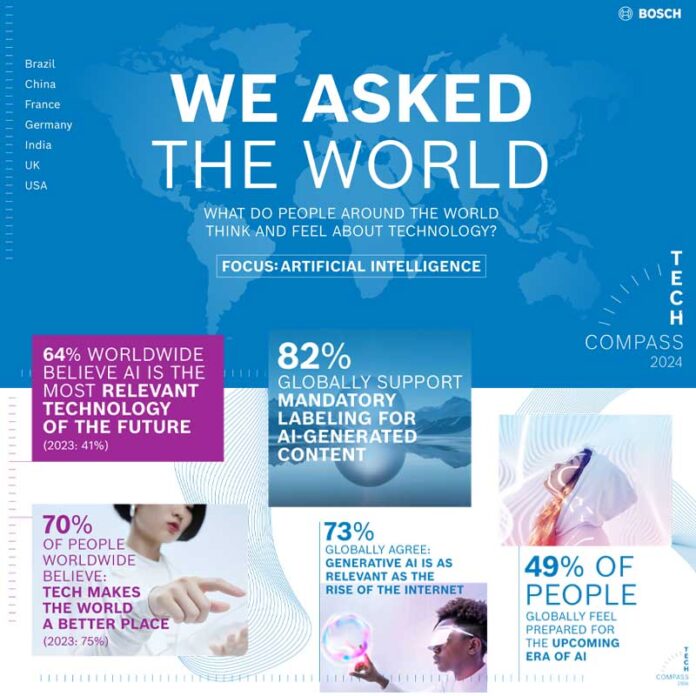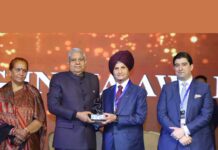
Boon or bane? Is AI more important now than ever? Will it have a lasting impact on humankind? Possibly, the most burning questions that are lingering in everyone’s mind today when it comes to the transformative potential of AI (Artificial Intelligence). Bosch’s third annual Tech Compass Survey underlines these views, highlighting the growing relevance of AI as a key driver of change world over.
With 64% of global respondents ranking artificial intelligence as the most influential technology in near future, the report reveals a strong sense of optimism among Indians, 76% of whom personally feel prepared for the upcoming era of AI led interventions. Conducted across Brazil, China, France, Germany, India, the United Kingdom, and the United States, the Bosch Tech Compass survey aims to explore global perspectives on emerging technologies, encompassing people’s attitudes, beliefs, expectations, concerns, and more.
“The survey reflects India’s increasing acceptance and enthusiasm towards emerging technologies like AI. India is keen on AI-powered solutions across diverse sectors such as sustainability, mobility, manufacturing, and even daily life. At Bosch, we recognize the potential of AI and are committed to implementing it responsibly to deliver a safer experience for everyone.” said Mr. Guruprasad Mudlapur, President of the Bosch Group in India, and Managing Director, Bosch Limited.
Combating climate change:
81% of Indians, and 71% of global respondents feel that technological progress shall be key to combating climate change. Indians strongly believe in the transformative potential of technology in addressing environmental challenges, underscoring the nation’s commitment to leveraging technological solutions for sustainable development.
AI in mobility:
Enhanced safety emerged as the most resonant sentiment amongst Indians (51%) and global (60%) respondents, when it comes to AI powered integrations in mobility. 48% Indians also expect AI driven solutions to facilitate easier and seamless parking. Among other benefits of AI, global respondents focused on reduced fuel consumption/ greater range (54%) and ADAS features enabling alternative activities while driving (34%).
Transparency in labeling:
79% Indians agree on the mandatory labelling of AI content, a belief which echoes strongly across all the geographies surveyed (82%). Bosch is calling for mandatory labeling on any AI-generated content to transparently state its
machine origin. This approach fosters transparency, reinforces accuracy, and empowers users to scrutinize and cite the source of AI-generated information.
Embracing AI in unexpected ways:
From 70% Indians trusting AI chatbots over acquaintances for solutions, to 62% showing willingness to see AI as stand-up comedians and 73% agreeing to follow AI recommendations for career path, the survey reflects India’s unique interest to integrate AI into daily life experiences.
Hopes and concerns:
While Indians expect emerging technologies like 5G (48%) and AI (46%) to have a positive effect on society, there are concerns around the negative impact of humanoid and service robots as well. 56% Indians stressed on the need for education to get prepared for AI and implement it responsibly. The nuanced understanding of complexities around advanced technologies reflects the need for its responsible deployment in future.
About The Tech Compass Survey:
For the survey, people aged 18 and over in seven countries (Brazil, France, Germany, United Kingdom, United States of America 18 – 69 years / China, India: 18 – 59 years) were polled online on behalf of Robert Bosch GmbH by the market researchers Gesellschaft für Innovative Marktforschung mbH (GIM) in December 2023. In France, Germany and the United Kingdom, 1,000 people were polled per country; in Brazil, China, India, and the U.S., it was 2,000 people each. The random samples are representative of their respective countries in terms of region, gender, and age (Brazil, France, Germany, U.K., U.S.: 18 to 69 years / China, India: 18 to 59 years).








